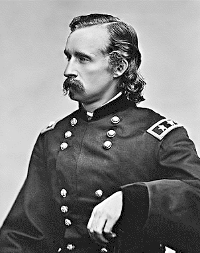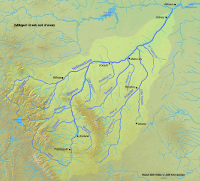On This Date In History
Custer, Selfishness, And The Little Bighorn - Part 2
December 29, 2015
Introduction
As presented in the first article in this series, many critics of Custer tend to characterize him as being selfish leading up to and during his final battle. Not only this, but his selfishness tends to be presented as a deciding factor in the battle's outcome and his defeat.
Was Custer selfish leading up to the battle? This article will attempt to present evidence that he was not.
Background
In June of 1876, Custer was with his outfit the Seventh Cavalry, looking for Sioux Native Americans who the government saw as being "hostile". This mission would ultimately lead to the Little Bighorn River and his final battle.
Major Reno (of the 7th Cavalry) had been sent out on a scout with a detachment of troops. From camp twenty miles south of the mouth of the Powder River on it's east bank, Reno was to go south along the Powder River to the mouth of the Little Powder. He was then to head west to Mitzpah Creek and follow it south almost to it's junction with the Powder River. He was then to head west to Pumpkin Creek and then north up the Tongue.
During Reno's scout, Custer would move with the rest of the outfit north up the Powder to where it connects with the Yellowstone and then head west to a location two miles south of the mouth of the Tongue and there await rendezvous with Reno.
Instead of going north up Pumpkin Creek, Reno crossed the Tongue and proceeded west to Rosebud Creek and then went north. While he was heading up the Rosebud, he came across a large Indian trail. According to one source, Reno followed this trail for a day to a day and a half. Without coming into contact with the Indians, he decided to return to the main camp and report.
Following Reno's scout, Custer reacted to it on at least two different occasions, and perhaps a third. Just when these reactions occurred is a bit unclear, so the order they are presented in is not meant to reflect chronological order.
Custer's First Reaction
The first reaction by Custer is found in the newspaper the New York Herald. It quoted him as saying:
"Few officers have ever had so fine an opportunity to make a successful and telling strike, and few have ever so completely failed to improve their opportunity."1
To say that Custer was displeased with Reno's performance would be putting it mildly. In comparing Reno's opportunity and failure to all officer opportunities and failures of all time, he placed the situation on a grand scale - thus demonstrating the height of his disappointment.
But if Custer was selfish at the time, why would he be disappointed? What should he care if Reno missed a golden opportunity? If anything he should've been pleased - now he could swoop in and win the victory for himself. That reaction would have been in keeping with what one would expect from a selfish individual. The fact that his reaction was the opposite is evidence that he was not selfish at the time.
Custer's Second Reaction
Custer's second reaction to Reno's scout is found in a letter he wrote to his wife. On June 21st, 1876 (four days from the Little Bighorn Battle) Custer wrote:
"The scouting-party has returned. They saw the trail and deserted camp of a village of three hundred and eighty (380) lodges. The trail was about one week old. The scouts reported that they could have overtaken the village in one day and a half. I am now going to take up the trail where the scouting-party turned back. I fear their failure to follow up the Indians has imperilled our plans by giving the village an intimation of our presence. ..."2
Here is another statement by Custer that he is disappointed with Reno's performance. Again, the question presents itself: why should he be disappointed if he was selfish for a victory for himself? If there was any doubt that Custer's first statement of disappointment may not have been genuine, this should remove that doubt. Clearly, Custer wasn't pleased.
Custer's Third Reaction
Besides the two statements of Custer's already presented, there is a story that Custer personally addressed Reno regarding his disappointment with his performance. This exchange supposedly took place in front of General Terry himself, the mission commander and Custer's commanding officer.
If this story has any credibility, it too serves to lend to the argument that Custer was indeed genuinely disappointed with Reno.
Conclusion
Custer is often presented as being selfish leading up to his final battle: that he wanted a victory for himself and that this selfishness brought about his defeat. Oddly enough, at the same time Custer is supposed to have been selfish, he was expressing disappoinment in another officer's failure to achieve victory. At least twice and perhaps a third time, Custer expressed his disappointment. At least once he expressed his disappointment in a strong tone. The number of times he expressed disappointment and his tone makes it clear that his disappoinment was genuine. This is at odds with a selfish depiction of Custer; one would expect him to be happy that he could now get the victory for himself. His genuine disappointment serves as convincing evidence that he was not selfish at the time.
Sources:
1. Stewart, Edgar I. Custer's Luck. University of Oklahoma Press, Norman, Publishing Division of the University 1955. 238. Print
2. Custer, Elizabeth Bacon. "Boots and Saddles"; Or, Life in Dakota with General Custer. New York: Harper & Bros., 1885. 311-12. Print.
Bibliography:
Stewart, Edgar I. (1955) Custer's Luck. University of Oklahoma Press, Norman, Publishing Division of the University.
About the Author
Tim Kloos is an online advertising professional. He helps clients with their websites, online presence, and online advertising. If you need help with any of these, feel free to contact him via the contact page.
His tech website is clevelandwebdesignplus.com.
He has also written a children's book set in the Old West.

